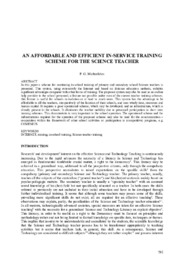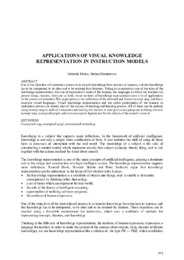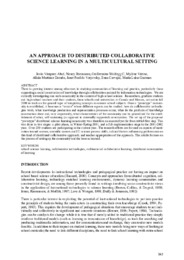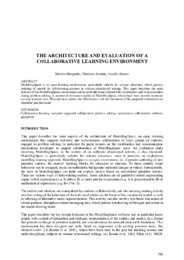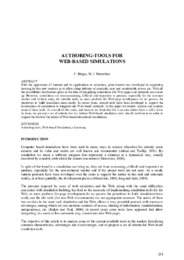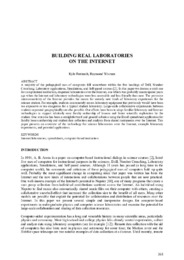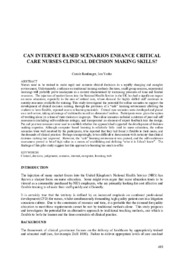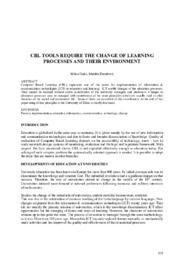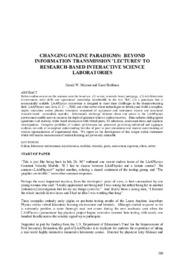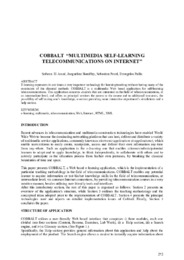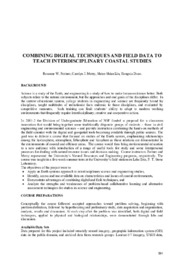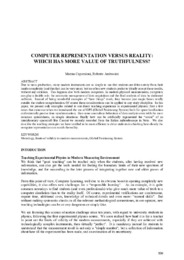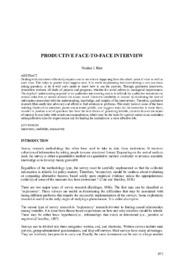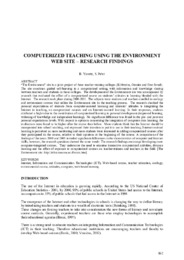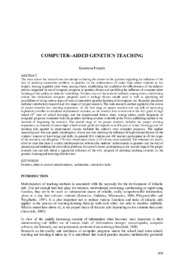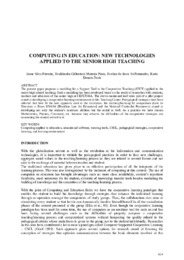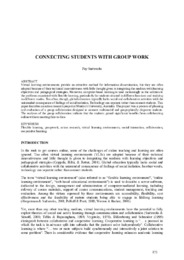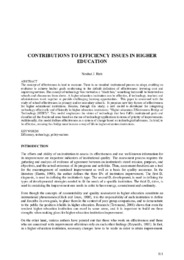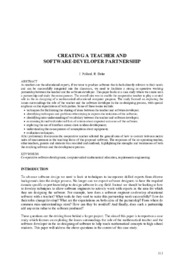Browsing CBLIS Conference Proceedings 2003 Volume I: New Technologies and their applications in education by Title
Now showing items 1-20 of 120
-
An affordable and efficient in-service training Scheme for the science teacher
(Department of Educational Sciences, University of Cyprus, 2003)In this paper a scheme for continuing in-school training of primary and secondary school Science teachers is presented. This system, using extensively the Internet and based on distance education methods, exhibits significant ... -
Applications of visual knowledge representation in instruction models
(Department of Educational Sciences, University of Cyprus, 2003)One of the objectives of instruction process is to transfer knowledge from teachers to learners, and this knowledge has to be interpreted, to be clear and to be retained from learners. Taking in consideration one of the ... -
An approach to distributed collaborative science learning in a multicultural setting
(Department of Educational Sciences, University of Cyprus, 2003)There is growing interest among educators in studying communities of learning and practice, particularly those supporting a social construction of knowledge through collaboration assisted by information technologies. We ... -
The architecture and evaluation of a Collaborative learning environment
(Department of Educational Sciences, University of Cyprus, 2003)ModellingSpace is an open learning environment, particularly suitable for science education, which permits building of models by collaborating partners in various educational settings. This paper describes the main features ... -
Authoring-tools for web-based simulations
(Department of Educational Sciences, University of Cyprus, 2003)With the appearance of Internet and its applications to education, great interest was developed in supporting learning by this new medium as it offers cheap delivery of materials, easy and comfortable access, etc. With ... -
Building real laboratories on the internet
(Department of Educational Sciences, University of Cyprus, 2003)A majority of the pedagogical uses of computers fall somewhere within the five headings of Drill, Number Crunching, Laboratory applications, Simulations, and Self-paced courses [2]. In this paper we discuss a sixth use for ... -
Can internet based scenarios enhance critical Care nurses clinical decision making skills?
(Department of Educational Sciences, University of Cyprus, 2003)Nurses need to be trained to make rapid and accurate clinical decisions in a rapidly changing and complex environment. Unfortunately, a reliance on traditional training methods (lectures, small group sessions, experiential ... -
CBL tools require the change of learning processes and their environment
(Department of Educational Sciences, University of Cyprus, 2003)Computer Based Learning (CBL) represents one of the terms for implementation of information & communication technologies (ICT) in education and learning. ICT enable changes of the education processes. They cannot be realized ... -
Changing online paradigms: beyond Information transmission 'lectures' to research-based interactive science laboratories
(Department of Educational Sciences, University of Cyprus, 2003)Robust online courses in the sciences must be based on: (1) sound, research–based pedagogy, (2) rich laboratory environments with skills and operational knowledge transferable to the wet ‘lab’, (3) a paradigm that is ... -
Cobbalt “multimedia self-learning telecommunications on internet”
(Department of Educational Sciences, University of Cyprus, 2003)E-learning represents in our times a very important technology for learning/teaching without having many of the constraints of the classical methods. COBBALT is a multimedia Web based application for self-learning ... -
Combining digital techniques and field data to teach interdisciplinary coastal studies
(Department of Educational Sciences, University of Cyprus, 2003) -
Computer representation versus reality: which has more value of truthfulness?
(Department of Educational Sciences, University of Cyprus, 2003)Due to mass production, many modern instruments are so simple to use that students are driven away from their inside complexity (and this fact can be very nice); but too often now students prefer to blindly accept those ... -
Computer-adaptive testing in science education
(Department of Educational Sciences, University of Cyprus, 2003)Dealing with interviews effectively requires one to see what is happening from the other's point of view as well as one's own. This helps to predict what happens next. It is worth emphasizing that interviewing is not just ... -
Computerized teaching using the environment Web site – research findings
(Department of Educational Sciences, University of Cyprus, 2003)“The Environment” site is a joint project of three teacher-training colleges (Kibbuzim, Oranim and Orot Israel). The site combines guided self-learning in a computerized setting, with information and knowledge sharing ... -
Computer–aided genetics teaching
(Department of Educational Sciences, University of Cyprus, 2003)The main aim of the research was the attempt at finding the answer to the question regarding the influence of the way of realizing curriculum problems in genetics on the achievements of junior high school students in this ... -
Computing in education: new technologies applied to the senior high teaching
(Department of Educational Sciences, University of Cyprus, 2003)The present paper proposes a modeling for a Support Tool to the Cooperative Teaching (STCT) applied to the senior high school teaching. Such a modeling has been developed based on the result of researches with students, ... -
Connecting students with group work
(Department of Educational Sciences, University of Cyprus, 2003)Virtual learning environments provide an attractive method for information dissemination, but they are often adopted because of their technical innovativeness with little thought given to integrating the medium with learning ... -
Contributions to efficiency issues in higher Education
(Department of Educational Sciences, University of Cyprus, 2003)The concept of effectiveness is hard to measure. There is no standard institutional process to adopt, enabling an evaluator to achieve his/her goals conforming to the default definition of effectiveness: lowering cost and ... -
Crafting the technological solutions in high school science and mathematic teaching and learning: matthew effects and the digital divide
(Department of Educational Sciences, University of Cyprus, 2003)This paper examines the practices and concepts used in teaching high school science and mathematics concepts (grade 9 - 12) which integrate computer and multimedia technologies and hands-on activities into disciplinebased ... -
Creating a teacher and software-developer partnership
(Department of Educational Sciences, University of Cyprus, 2003)As teachers are the educational experts, if we want to produce software that is both directly relevant to their needs and can be successfully integrated into the classroom, we need to facilitate a strong co-operative working ...
